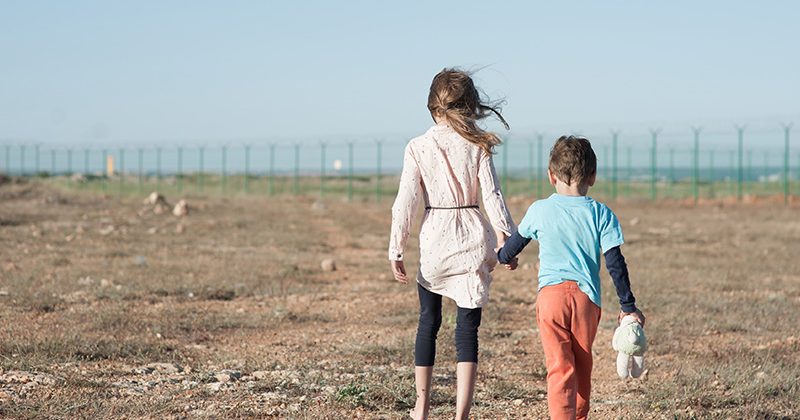Evidence to enhance children’s lives
UNICEF, the United Nations Children’s Fund, provides more children with clean water, life-saving therapeutic food and vaccines, education and protection from violence than any other humanitarian organisation.
In the current global political climate, evidence, facts and objective assessment are needed more than ever to help enhance the rights and well-being of the world’s children and to ensure that organisations like UNICEF achieve maximum value for money for children with every UNICEF dollar spent.
Award-winning, high-quality, high stakes evaluation

Against a backdrop of record levels of humanitarian need and the inaugural World Humanitarian Summit, in 2016 UNICEF commissioned Itad to conduct the first-ever global evaluation of UNICEF humanitarian action in complex humanitarian situations.
The aim was to generate, through robust and systematic analysis across a range of country contexts, practical solutions for the improvement of the coverage and quality of UNICEF response to crises, and reach the most vulnerable people in increasingly challenging and complex humanitarian settings.
Itad led this multidimensional evaluation from 2017 to 2019 in two phases: a pilot phase and a synthesis review. The pilot phase used a mixed methods approach by analysing over 2,000 documents, 11 country case studies, over 500 key informant interviews and focus group discussions. The case studies covered some of the world’s most challenging locations including; Afghanistan, Burundi, the Central African Republic, Nigeria, Mali, Pakistan, the Philippines, Somalia, the State of Palestine, the Syrian Arab Republic and Ukraine. Additionally, in-depth interviews took place in Iraq, South Sudan and Yemen. The synthesis review looked extensively into the past 30 evaluations conducted on UNICEF’s humanitarian action between 2010-2017 and assessed its equitable coverage, achievement of targets and its approach in these high-risk settings.
The evaluation was awarded ‘Best Cross-Cutting Evaluation’ in the Best of UNICEF Research and Evaluation 2020 Awards.
UNICEF stated:
“This high-quality, ‘high-stakes’ evaluation helped UNICEF to tackle tough issues and take stock of the effectiveness of its response to crises in high-profile and high-threat environments.”
The award panel highlighted the evaluation’s extensive influence on policy and programming. They also praised the evaluation’s comprehensive and rigorous approach and well-presented recommendations that proposed practical solutions that were subsequently implemented.
Jane Mwangi, UNICEF’s Evaluation Manager, said:
“The evaluation has influenced UNICEF’s Strategic Plan, its humanitarian programming and investments. It has also been a catalyst in the revision of the Core Commitments for Children (CCCs) in humanitarian action, as well as initiating UNICEF’s humanitarian review, which has examined UNICEF’s humanitarian operations in the context of the global challenges of the 21st century.”
Influencing policy and programming
By facilitating stakeholder dialogues, the evaluation probed tough issues such as the difficulties in gaining access to and reporting on vulnerable target populations, as well as limitations posed by donor conditionality. It led to a range of actions for change such as:
Catalysing the update of UNICEF’s Core Commitments for Children (CCCs) in humanitarian action
UNICEF’s CCCs were established in 1998 and are at the very core of their policies. The evaluation sparked clarification of commitments in relation to coverage, quality and equity, through the revision of the CCCs (which reference the evaluation).
Shaping UNICEF’s strategy
Despite the UNICEF Strategic Plan 2018-2021 being developed prior to the evaluation, revisions were subsequently made to its policies and procedures based on the evaluation. This included updates to the UNICEF Office of Emergency Programmes’ strategic review of humanitarian action and the Humanitarian Action for Children 2020 report, in addition to influencing UNICEF’s humanitarian programming and investments.
Improving leadership and response capacity
The evaluation greatly shaped the formulation of UNICEF’s Office of Emergency Programme’s dedicated humanitarian learning strategy from 2019. The strategy included the creation of the Humanitarian Leadership Workshop series which targets senior UNICEF managers working in the field in complex and high-threat environments. Over 170 UNICEF senior field managers have received training through the workshops and close to a 100 more will participate in 2023.
Initiating UNICEF’s Humanitarian Review
The Humanitarian Review examines UNICEF’s humanitarian operations in the context of the global challenges of the 21st century – it focuses on the changes that are needed to meet identified challenges. The Review process was initiated partly in response to the Itad evaluation.
Improving accountability and use of evidence
In line with the evaluation’s recommendations, UNICEF’s Executive Board requested approaches to improve accountability to the people they serve and encouraged vulnerability analyses to be carried out by country offices based on the evaluation. Discussions between evaluation and programme staff have helped to both clarify the strategic vision and, in particular, obtain disaggregated data to assess the needs of vulnerable populations
Influencing wider learning
Afghanistan, Central African Republic, Nigeria and Somalia country offices turned their country case studies into full evaluation reports. The impact of this evaluation demonstrates their drive to delve deeper and improve the humanitarian landscape within their countries based on the findings.
Influencing external humanitarian architecture
The evaluation urged UNICEF to promote greater consistency in the United Nations security management system as it applies in a humanitarian context, and to employ UNICEF security officers until such reforms take place. As recommended by the evaluation, UNICEF shared the evidence and lessons learned from the integrated approach it took with the World Food Programme and World Health Organization in Somalia in 2019.
Overall, the evaluation benefitted UNICEF by providing an awareness of the issues of working in complex settings and how to tackle them and deliver high-quality humanitarian assistance despite the most challenging circumstances. By implementing and taking action on the evaluation recommendations, UNICEF is helping to improve their programme coverage and effectiveness and ensuring equitable access to humanitarian assistance for the world’s most vulnerable populations.
This impact story was developed by Shriya Samani of Itad’s Research Analyst Programme, with contributions from Leonora Evans Gutierrez.

